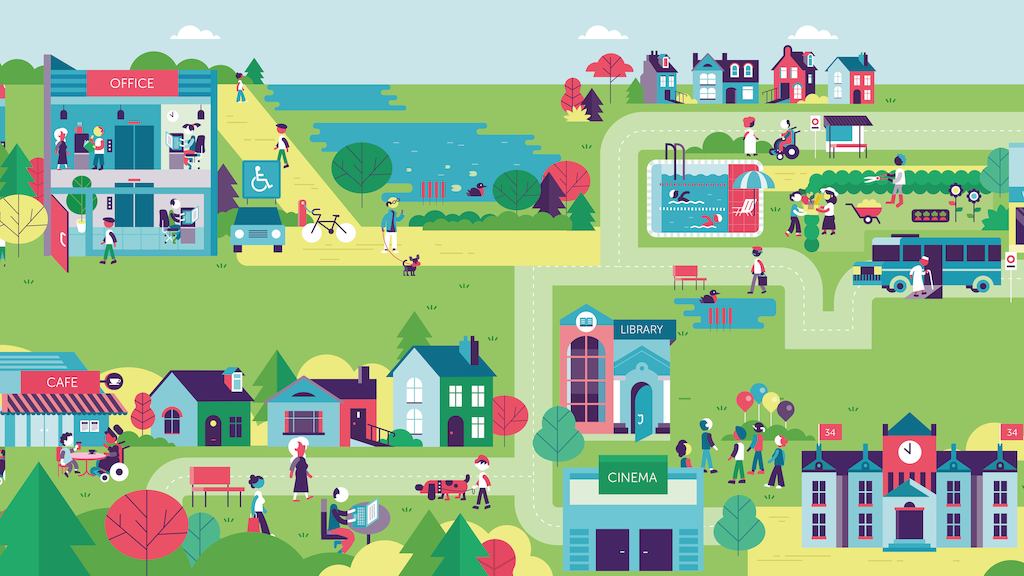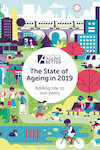A year in review: our impact in 2018-2019

Impact report from Centre for Ageing Better, one year on from its 'Transforming later lives' strategy.
The age profile of our society is changing rapidly. The number of people aged 65 and over will increase by more than 40% within 20 years, and the number of households where the oldest person is 85 and over is increasing faster than any other age group.
But millions of us risk missing out on a good later life, with 16% of people aged 65 and over living in relative poverty.
In July 2018, following an extensive and collaborative process, we launched a bold vision to transform people’s experience of later life. Our new strategy, Transforming later lives, has a specific focus on helping people who are currently approaching later life – almost a quarter of the population – and particularly those who are at risk of missing out on a good later life.
Read about our impact below under each of the priority work areas:
We continue to work in partnership with a diverse range of organisations and could not have done any of this without their support.
Fulfilling work
We published our guide Becoming an age-friendly employer that set out five actions employers can take to improve the way they recruit, support and retain older workers – covering flexibility, recruitment and health at work. This guide is our catalyst for influencing large employers and generating a movement for change in the business and public sectors.
We used this guide extensively through the year in discussions with employers and Government, including with the Flexible Working Task Force, and the Women and Equalities ‘Older People and Employment’ Inquiry. We also set out the lessons from four pilot ‘mid-life MOT’ schemes Developing the mid-life MOT, showcasing how Aviva, Legal & General, The Pensions Advisory Service (TPAS) and Mercer approached helping workers to plan and prepare for later life.
We published our Health warning for employers report in April, which summarises the key findings from our research with Greater Manchester, and informed the design of the Working Well Early Help service for over 50s. The report highlighted that older workers are more likely than younger workers to be managing multiple long-term conditions and that health conditions are the main driver of older workers exiting the labour market before they reach state pension age.
Our partnership in Greater Manchester enabled us to continue to work to tackle inequalities and develop and test new and innovative approaches to supporting people over-50s back into work.
We called on Government and employers to do more to improve workplace-based prevention and management of health conditions; many small and inexpensive adjustments can provide a huge benefit to people who want to continue working in later life.
Valerie's voice – the demands of work and ill health
Read moreSafe and accessible homes
We continued to produce influential insights on aids and adaptations. Our Homes that help research explored the lived experiences of individuals who use home adaptations, and practitioners who work alongside them, and showed how changes in the home can have a hugely positive impact on quality of life.
In October we released our Adapting for ageing report, in collaboration with Care & Repair England. The report explored innovative approaches by local areas in delivering home adaptations for residents and encouraging councils to learn from the good practice we identified.
Our research influenced a review of government capital grants and revenue funding, and we were pleased to see an extra £55 million for Disabled Facilities Grants, and another 8% announced as part of the 2019/20 Policy framework for the Better Care Fund. We also stimulated major research funders to fund work to fill the evidence gap that exists around demonstrating the cost-benefit of housing adaptations. Local areas have been able to learn from and begun to implement each other's best practice, with Leeds City Council using our review to inform their Health Needs Assessment and Milton Keynes Council investing an extra £500,000 in home adaptations.
Beryl's voice – living in an unsuitable home
Read moreHealthy ageing
Working with the Chief Medical Officer’s Expert Group of researchers, and in partnership with Public Health England (PHE), we published new evidence on the best exercise to improve strength and balance, which gained widespread coverage.
Following this, we released our report Raising the bar on strength and balance: The importance of community-based provision. The report highlighted that programmes designed to boost the muscle strength and balance of people at risk of falls and injury are not being prioritised by the NHS and local authority commissioners. As part of this we worked closely with 14 local areas to help them improve referral pathways and commissioning of local programmes.
We were also proud to announce the signing of a Memorandum of Understanding with Public Health England. Through a five-year strategic partnership, we will work together with PHE in using evidence based public health interventions to help people maintain their ability to do the everyday things they want to do as they age.
On national policy, our insights were fed into the development of the NHS Long Term Plan. We were also involved in early discussions to help shape the Prevention Green Paper to focus on ageing.
Raising the bar on strength and balance: The importance of community-based provision
Connected communities
We launched our first ever grant programme, with the Department for Digital, Culture, Media and Sport. Together we awarded more than £270,000 to five projects to pilot, develop and share new approaches to age-friendly and inclusive volunteering.
The projects in North Yorkshire, Oxfordshire, East Sussex, Kent and London each received just over £50,000 and we are providing them with additional non-financial support. They will use the funding to develop good-practice approaches that will help to promote and sustain voluntary and community activity for people over 50, with a focus on those who might face barriers to taking part.This includes people in formal volunteering roles as well as those who may help their friends and neighbours in other ways.
The fund was launched following our Age-friendly and inclusive volunteering review of community contributions in later life. It found that many older people face barriers to taking part or staying involved, which can get worse if their circumstances change.
This year, we grew the UK Network of Age-friendly Communities from 19 to 34 members. We held our second Age-friendly Communities Conference in Liverpool, which was attended by 30 member communities and was an opportunity to connect, share learning, ideas and best practice.
Guide to making the most of volunteers' talents launched: Age-friendly and inclusive volunteering
Read moreOther significant areas of work
The State of Ageing in 2019
In March we launched our flagship report ‘The State of Ageing in 2019’, giving a snapshot of what life is like for people aged 65 and older today, and explored the prospects for people currently in their 50s and 60s.
Our launch event convened experts across government, health, media and charities. We will monitor the measures we included in the report and track these against the changes we seek to bring about over the next ten years.
Industrial Strategy Grand Challenge on Ageing
We gave significant policy development support to the Government’s Industrial Strategy Grand Challenge on Ageing (which is designed to stimulate innovation in products and services for an ageing population).
We developed the Healthy Ageing Challenge Framework, to inform the Healthy Ageing Challenge Fund. We hosted a breakfast debate, with Caroline Dinenage, Minister of State at the Department of Health and Social Care, exploring the opportunities that the ‘grand challenge’ of an ageing population presents.
We completed our work on digital capability for people in later life with the Good Things Foundation, culminating in a practical guide to helping older people use the internet.

